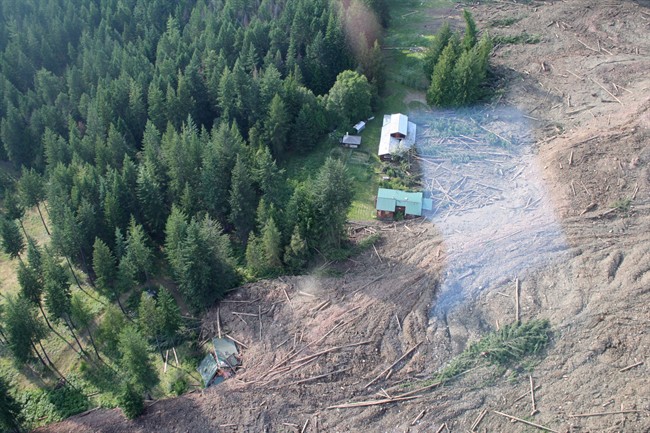JOHNSONS LANDING, B.C. – Two years after a landslide tore down the slopes of Johnsons Landing, B.C., claiming the lives of four people in a wave of mud, trees and rock, the last of the evacuated residents are finally being allowed to return home.

But the Regional District of Central Kootenay in southeast B.C. is cautioning residents that risks and hazards remain and those problems will have to be weighed when the evacuation order is finally lifted on Thursday.
“We’ve said very clearly to the residents when we’re lifting the evacuation order that just because it’s lifted doesn’t necessarily mean it’s safe to return,” said Brian Carruthers, chief administrative officer of the Regional District of Central Kootenay.
“Residents are going to have to use their own judgment and consider the risks associated with returning to their property.”
The largest landslide to hit the region in 12,000 years struck July 12, 2012, sending 320,000 cubic metres of debris down an area known as Gar Creek, destroying four homes and damaging others.
The landslide claimed the lives of Valentine Webber, 60, his 17- and 22-year-old daughters Rachel and Diana, as well as Petra Frehse, 64, of Germany.
A second slide struck the following day, narrowly missing emergency responders, residents and journalists.
A report released by the regional district in May 2013 blamed the tragedy on a deluge of rain and a late spring snowmelt and identified 18 properties that remained at risk.
The danger level was considered to be “very high” for five of those properties, meaning the risk of dying for someone living on those properties due to a slide in any given year would be as high as one in 10. Nine other properties were in an area considered to be at a high risk, while four more were in a zone where the risk was considered moderate.
The report recommended restricting land and house development on those 18 properties, unless geotechnical research indicated the areas are safe. It also said such work would likely be too expensive to conduct for some of those properties.
Carruthers called the length of the evacuation order “rather unprecedented,” but added an estimated 800,000 cubic metres of debris was suspended above the community and was continuing to move.
“Everybody involved wanted to have a higher level of confidence that if we had lifted the evacuation order that the chances of something happening in the future were mitigated,” he said.
He said not everybody affected was a permanent resident and several seasonal properties were also covered by the evacuation order.
John Kettle, chairman of the regional district said in a news release that staff have worked with the provincial government to address all outstanding issues and officials waited for the end of the freshet, the release of snowmelt and rainwater, before lifting the order.
Johnsons Landing resident Gregory Utzig, who had part of his property in the evacuation zone, credited his local government representative for working “long and hard” to rebuild the community’s water system, he was critical of municipal and provincial officials.
“I think the general idea is if government would just go away it would probably be better than it is now,” said Utzig who has spent 30 years specializing in landslide work.
He said the provincial emergency system helps people for the first month after a disaster, but after that there is almost nothing, adding there has been little compensation.
“Some people have lost their life savings and their home.” he said. “They have a piece of property that they are paying taxes on that they can’t use for anything.”
By May 2013, the provincial government had provided about $300,000 in disaster financial assistance to local residents and planned to provide an equivalent amount again to an undisclosed number of residents.
An official with Emergency Management B.C. said at the time the government didn’t have to provide more compensation because the province wasn’t at fault, and the slide was considered an act of God.
— by Keven Drews in Vancouver



Comments